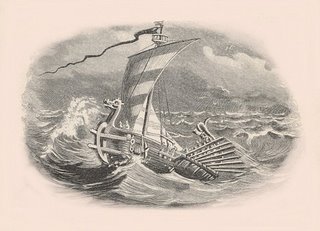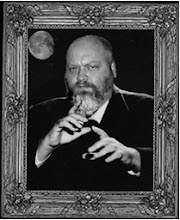More Wisdom from the keyboard of Steve McNallen
 In Germanic cosmology there are two major features: the Well and the Tree. The Tree is the mighty Yew, the framework of the cosmos, and in it hang all the Nine Worlds. The Tree is all that which IS at any given instant.
In Germanic cosmology there are two major features: the Well and the Tree. The Tree is the mighty Yew, the framework of the cosmos, and in it hang all the Nine Worlds. The Tree is all that which IS at any given instant. The Well, on the other hand, is the repository of all that which has been - the past, if you will. As we go about our lives, our deeds deposit layers in that Well. These layers constitute our "fate," or more properly our orlog (or=primal; log=layers). These layers continue to influence the present. In other words, the layers we put in the Well help determine what happens to us. We get the fate we make, at least partially.
Philosophically, this is significant because it affirms free will and human effort while refuting fatalism.
However, it gets more complicated: We are not the only ones putting layers in the well. Our own deeds have greater immediacy for our own lives, but the outcome of events is also shaped by the deeds of others - vast forces, usually impersonal, that condition what can or cannot be done at any given time. Because the equation describing that-which-is is thus a complex one, we may not be able to get the outcome we desire in any given situation. The momentum of other layers in the Well may simply outweigh any power we can bring to bear.
It is here that heroism comes into play. Edith Hamilton, in her book Mythology, writes that "The hero can prove what he is only by dying." I read that line as a young man, and it took me years to truly understand it. A human may exert all his or her power (physical, mental, and spiritual) to attain a goal. This is a noble thing, but gaining victory is not the greatest test of heroism. The ultimate expression of the heroic ethic is to fight one's hardest and lose the battle - but to accept defeat calmly and meet death with a joke on one's lips. In other words, the enemy can take victory but they cannot take the dignity of the great soul; that remains forever under the control of the hero's will.
We can draw power from the past - from the Well itself - to aid us in our personal battles. The sumbel horn is, magically speaking, the Well. The mead within it is the accumulated orlog. By drinking from the horn with intent and invoking some specific form of that-which-has-been, we bring the might of the past into the present and immerse ourselves in it that we may use that might to seek our own victories. This involves making a toast (thus harnessing some of the Well-bound might of others, to include the Holy Powers themselves), a boast of a personal accomplishment (reaffirming our own layers laid down successfully) or some other mighty verbal gesture such as a song or poem that also captures the courage, power, endurance, or even the sense of humor expressed in the past.
While social bonding and the speaking of one's mind are valuable side effects of the sumbel, we would do well to remember the fundamental aim, which is to manifest the power of the past and apply it to our present and future struggles. As such, sumbel becomes a magical act of great significance, with immense benefits for the participants. I urge you to incorporate a verbal prologue at the beginning of your sumbels to take full advantage of this effect and to teach those who sit at your table!


0 Comments:
Post a Comment
<< Home